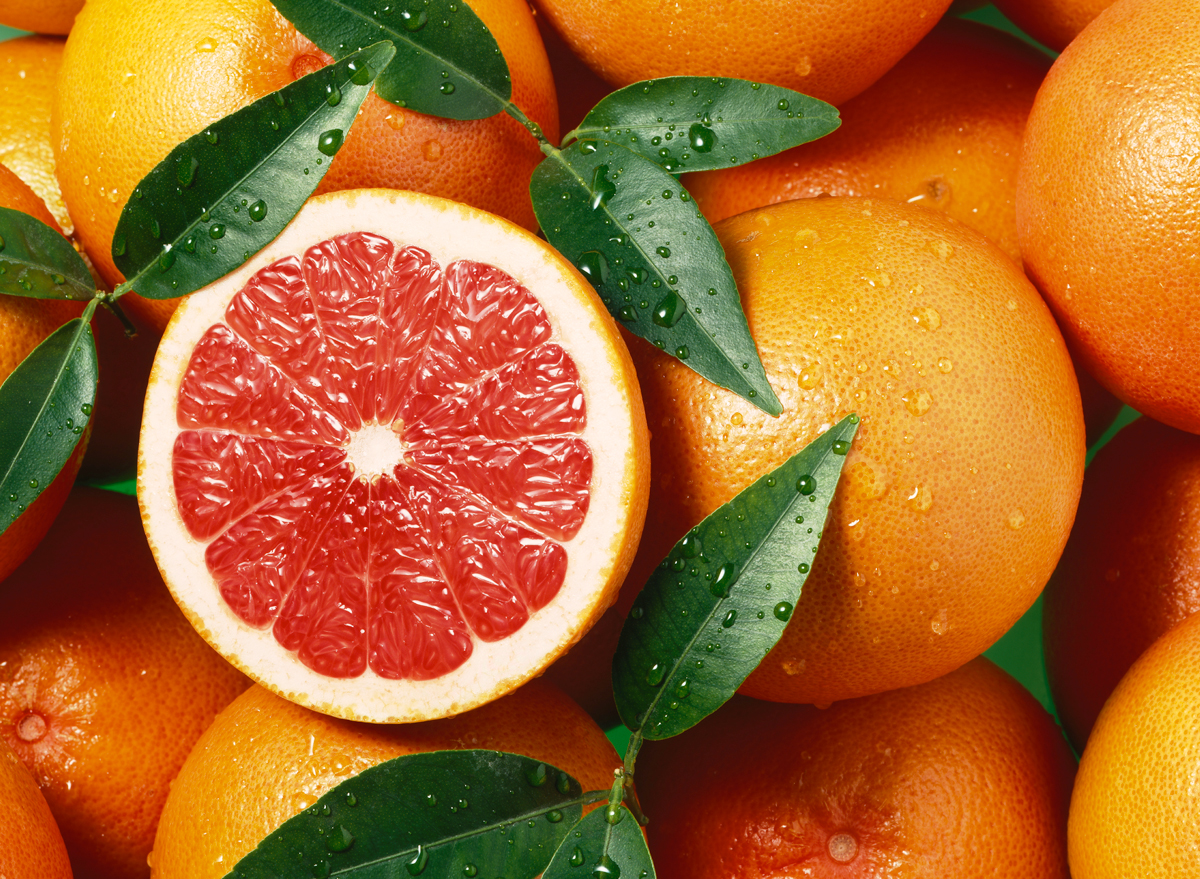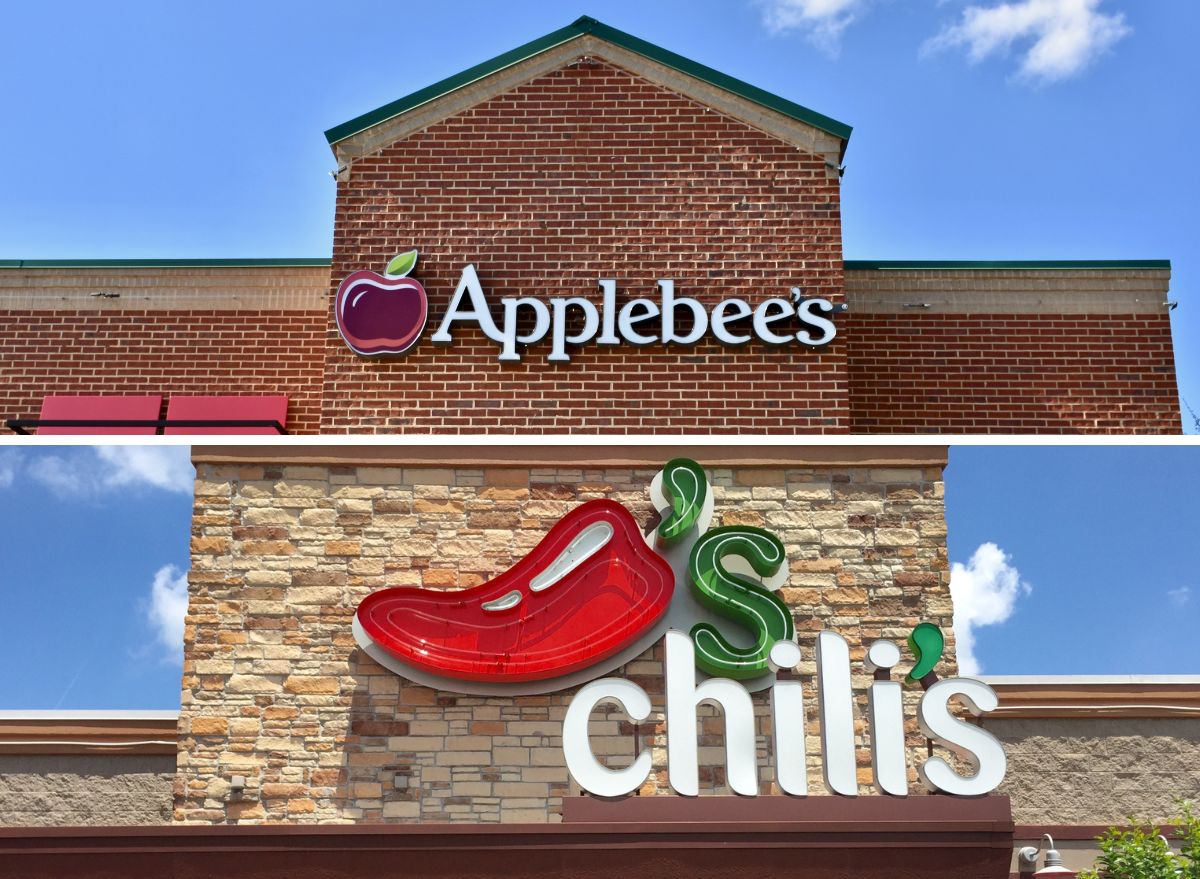The frustrations that come with trying to lose weight or body fat can be excruciating sometimes, which is why many people turn to “quick fix” products on the market like weight loss pills or belly fat teas. Unfortunately, not only do these products not work in the long run, but they can even become harmful to your health.
Even though you may feel the need to eliminate tons of food from your diet when you’re trying to lose weight, it is actually quite often the foods that you can add that will make a difference.
One of the most effective ways to lose weight is to ensure that you’re filling your diet with healthy foods, and there are certain “fat-burning foods” out there that are full of helpful nutrients and great for your overall health—making them so much better than any quick fix diet product you can buy.
Before getting to the list of these foods, it’s important to understand what we mean by “fat-burning food.” There is no food that exists that can help you burn fat on its own. Instead, it’s about maintaining a healthy lifestyle and incorporating healthy foods into your routine.
“It’s essential to understand that while certain foods may slightly boost metabolism or assist in weight management, they are not magical solutions on their own,” says Amy Goodson, MS, RD, CSSD, LD. “To lose fat, a combination of a healthy diet, regular exercise, and other lifestyle factors is essential.”
The following fat-burning foods contain certain nutrients that have been proven with research to aid in fat loss and overall weight loss. Again, this isn’t to say that these foods can make you lose body fat on their own, but when incorporated as a part of a balanced diet, they can help you achieve your goals. Read on, and for more healthy eating tips, check out the 12 Best Foods for Defined Abs.
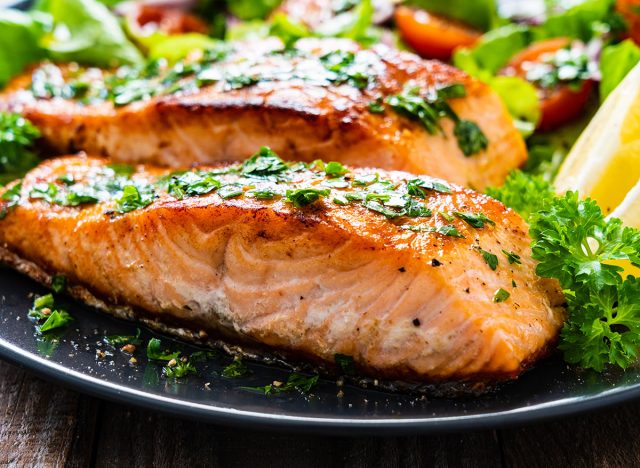

Salmon is a popular fish full of nutrients like protein and healthy fats. For one, the amount of lean protein in salmon (17 grams per serving) can help you achieve your fat loss goals because of the positive effect that a high-protein diet has on weight loss and reduced body fat.
Along with that, Goodson adds that “Fatty fish like salmon are high in omega-3 fatty acids, which have anti-inflammatory properties and may influence fat metabolism,” she says. In fact, according to a study published in the journal Hindawi, supplementation of omega-3 fatty acids can increase resting metabolic rate in adults.


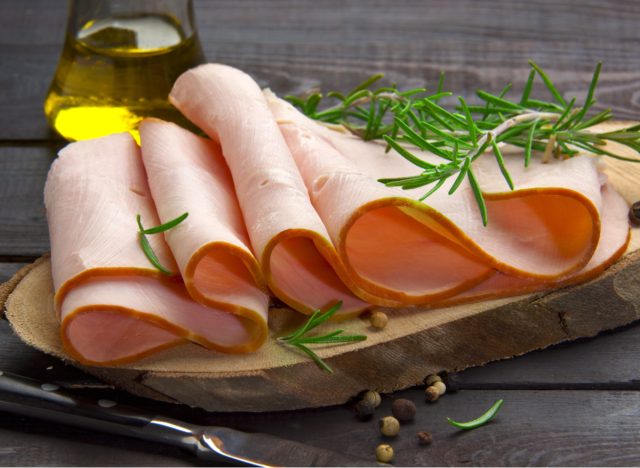

One effective way to help burn some stubborn fat is to make sure you’re getting enough protein in your diet. “Protein has a high thermic effect, meaning your body expends more energy digesting protein compared to fats and carbohydrates,” says Goodson. “Additionally, a high-protein diet can help you feel fuller, which can lead to reduced calorie intake and weight loss.”
One easy, delicious, versatile way to get more of this nutrient is with a fat-burning food: turkey! In three ounces of turkey breast, you’ll get 24 grams of protein and less than seven grams of fat, and in a three-ounce serving of ground turkey, you’ll get around 23 grams of protein and less than nine grams of fat.
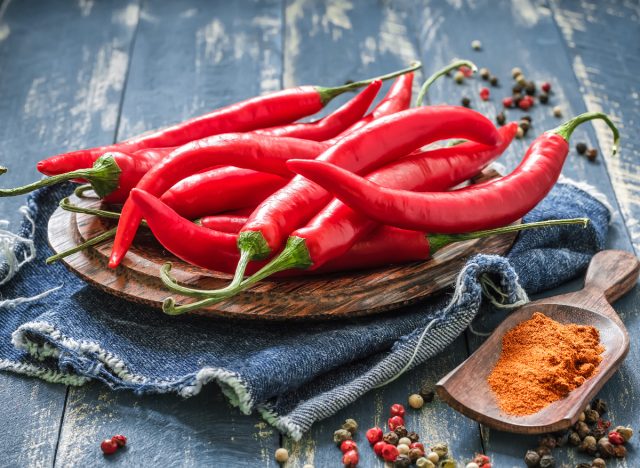

Chili peppers are good for more than just a boost of flavor in your favorite dishes. This spicy pepper turns up the heat in your weight loss goals with a key compound called capsaicin.
“The capsaicin in chili peppers can temporarily increase metabolism by promoting thermogenesis, which is the process of heat production in the body,” says Goodson. “This effect is relatively small, but over time, it may contribute to fat loss.”
Trista Best, MPH, RD, LD at Balance One Supplements adds that “Capsaicin not only boosts metabolism but may also decrease appetite, helping you consume fewer calories overall.”
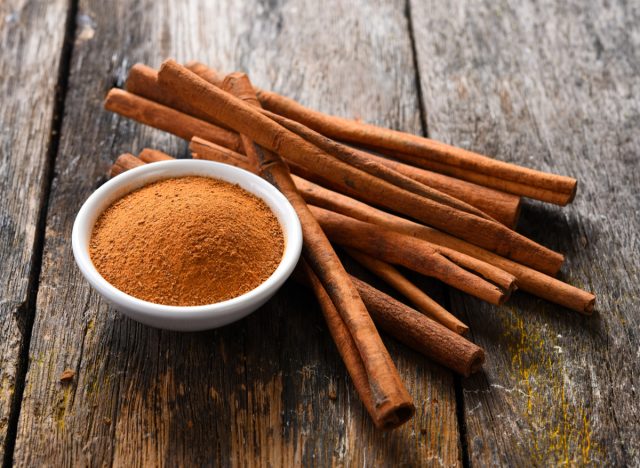

Whether you’re sprinkling it on your oatmeal, adding a dash to your morning latte, or even taking it in supplement form, Goodson says that cinnamon can aid in your fat loss goals by way of blood sugar management. “Cinnamon has been suggested to help regulate blood sugar levels and improve insulin sensitivity, and stable blood sugar levels can reduce cravings and overeating, potentially aiding in weight management.” Also, higher, more unmanaged blood glucose levels have also been linked to increased weight gain.
Cinnamon also contains a compound called cinnamaldehyde, which is known for giving this spice its burst of flavor. According to a 2012 study on mice, which was published in the Journal of Nutritional Science and Vitaminology, the mice who consumed cinnamaldehyde lost fat around their abdominal area, whereas the mice that didn’t eat the compound did not lose abdominal fat.
A more recent study published in the Journal of Food Biochemistry found that supplementing cinnamon was linked to both reduced BMI and body weight as a whole.
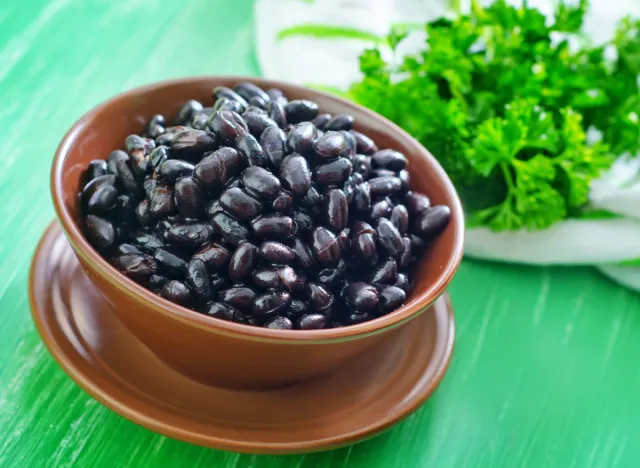

If you’re not eating black beans on a regular basis, you’re missing out on a delicious way to consume more fiber and protein, as well as lose more body fat. For one, black beans are loaded with 15 grams of fiber and protein per cup—numbers that are hard to come by with many other foods.
A study published in Obesity found that over a five-year period, increasing your daily fiber intake was associated with an almost 4% decrease in waist circumference.
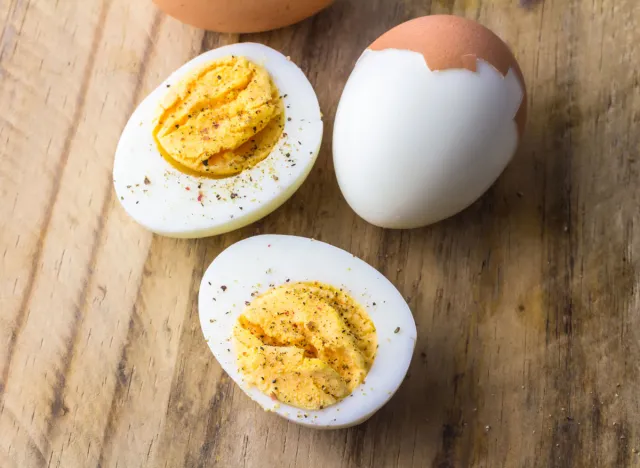

Scramble them up or throw a hard-boiled one on top of a salad or piece of toast, but however you choose to cook it, eggs can provide your body with amazing health and fat-burning benefits.
“For one, eggs are a great source of high-quality protein and essential nutrients, and they are particularly rich in choline—which plays a role in fat metabolism,” says Goodson. She also adds that “Eating eggs can help you feel full and satisfied, reducing the likelihood of overeating throughout the day, and that the protein in eggs has a high thermic effect, meaning it requires more energy to digest, which can support a slight increase in calorie expenditure.”
Also, one study published in Nutrition Research found that male participants who ate eggs for breakfast experienced less hunger after breakfast and consumed fewer calories throughout the day than the participants who ate a bagel for breakfast.
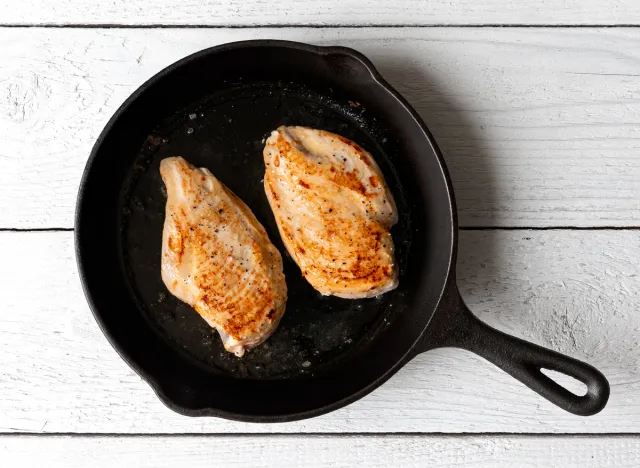

Speaking of the thermic effect of higher-protein foods, Best recommends adding chicken as a fat-burning food to your diet.
“Chicken is high in protein, which can increase feelings of fullness and require more energy for digestion, aiding in fat loss,” says Best. “The thermic effect of lean proteins is substantial, meaning that your body expends a significant amount of energy to digest and process them, making them an efficient choice for fat loss.”
One study published in Food & Nutrition Research found that eating poultry alongside a vegetable-heavy diet was helpful in decreasing the risk of weight gain or obesity.
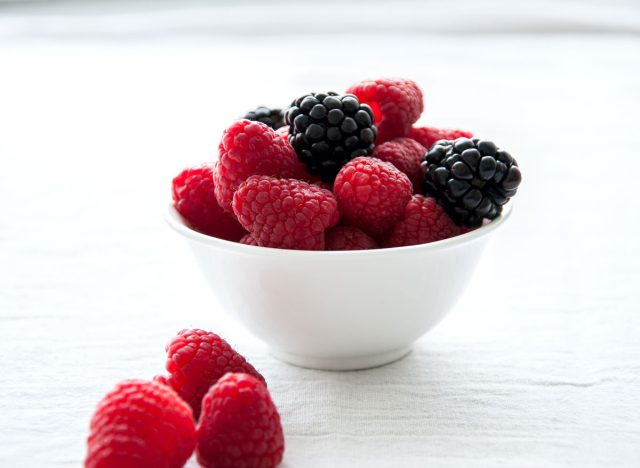

You can’t go wrong with berries. They are full of nutrients and antioxidants, and they can add a hint of sweet to anything like yogurt, oatmeal, salads, and water. According to Best, berries like blueberries, strawberries, and blackberries make for great fat-burning snacks.
“Berries are low in calories and high in fiber, helping to control hunger and stabilize blood sugar levels, and the antioxidants in berries also combat oxidative stress, potentially enhancing the body’s ability to burn fat and promoting overall well-being,” says Best.”
One study published in Nutrients found that wild blueberries can help “accelerate fat oxidation” and fat burning in active males.
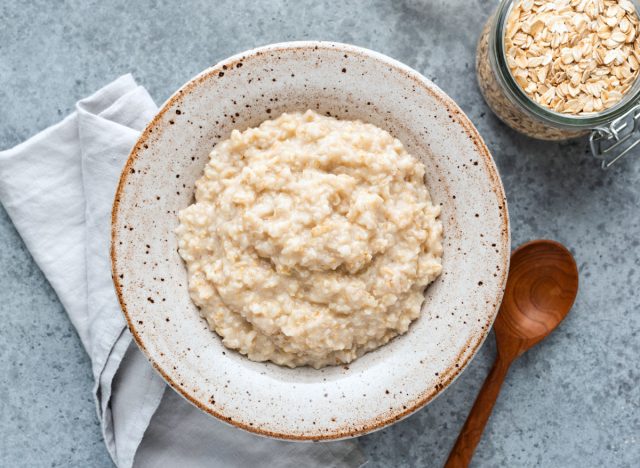

Oats are nutrient-heavy grains that can provide you with fiber, carbohydrates, and protein, and according to Best, oatmeal can be a helpful breakfast for your weight loss goals.
“Oatmeal is a complex carbohydrate that provides sustained energy and keeps you feeling full, preventing overeating,” says Best. “These complex carbohydrates release energy gradually, helping to sustain energy levels and prevent sudden hunger pangs that lead to overeating and weight gain.”
According to a report published in Nutrients, consumption of whole grains (like oats or brown rice) was linked to weight loss and decreased BMI. One of the main components that makes whole grains so healthy is their high fiber content. Research published in Annals of Internal Medicine found that increasing your fiber intake on a daily basis can help with weight loss, and with one cup of oats providing eight grams of fiber, this breakfast food can help your goals significantly.
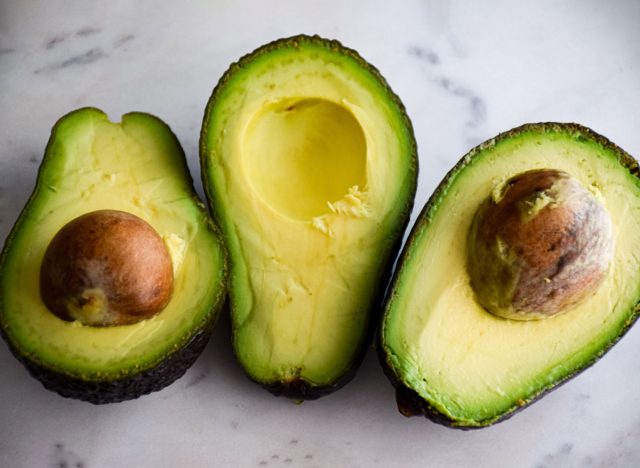

Get the mortar and pestle ready for some delicious guacamole, because guac’s base fruit—avocados—are known for being a healthy, fat-burning food.
“Avocados are rich in healthy fats and fiber, which can help control appetite and promote fat burning,” says Best. “The combination of healthy monounsaturated fats and fiber in avocados promotes feelings of fullness and can reduce the consumption of less healthy, high-calorie foods.”
According to a 2019 study published in Nutrients, participants at a “healthy weight” who consumed avocados ended up gaining less weight than those who didn’t consume this fatty fruit.
The main fat found in avocados is known as monounsaturated fat, and one research study published in Diabetes Care found that consumption of this fat can help prevent excess body fat.
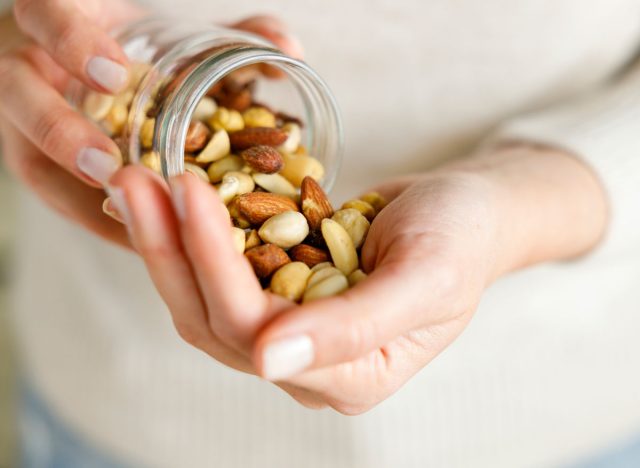

When you’re craving a snack, grab a handful of your favorite nuts for a satiating treat that can also aid in fat loss goals. Some people worry about eating nuts because they’re higher in fat and calories, but according to a study from Nutrients, eating nuts was linked to better weight management and less weight gain over time.
“Nuts are a source of healthy fats and protein, making them a satisfying snack that can reduce overall calorie intake,” says Best. “Some nuts (like almonds) are also a source of nutrients like magnesium and vitamin E, contributing to overall health.”
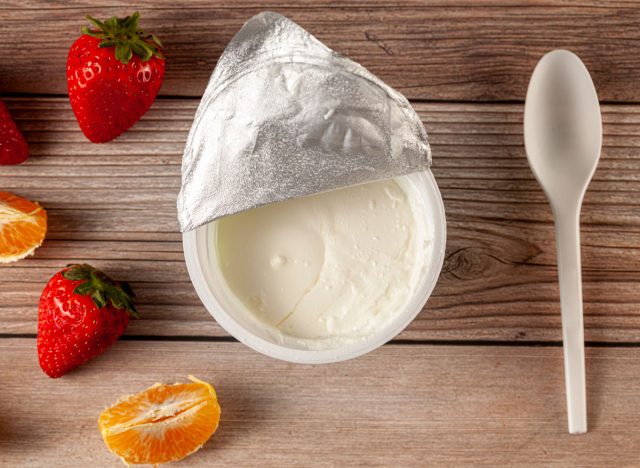

As we mentioned earlier, diets higher in protein can help with fat-burning and weight loss, so a low-fat, high-protein yogurt like Greek yogurt makes for the perfect fat-loss snack.
“Greek yogurt is high in protein, which can help boost metabolism and reduce overall calorie consumption when consumed as part of a balanced diet,” says Best. One study published in the International Journal of Obesity concluded that consuming yogurt can lower body weight, reduce waist circumference, and lessen body fat.
READ RELATED: Popular Zero-Calorie Sweetener Linked to Serious Health Risks—Here Are 4 That Are Safe
Goodson also adds that “The probiotics in yogurt may also positively impact gut health, which could influence weight regulation.” In fact, a study from the journal Genes found that a diverse, healthy gut microbiome was linked to decreases in BMI and overall fat mass.
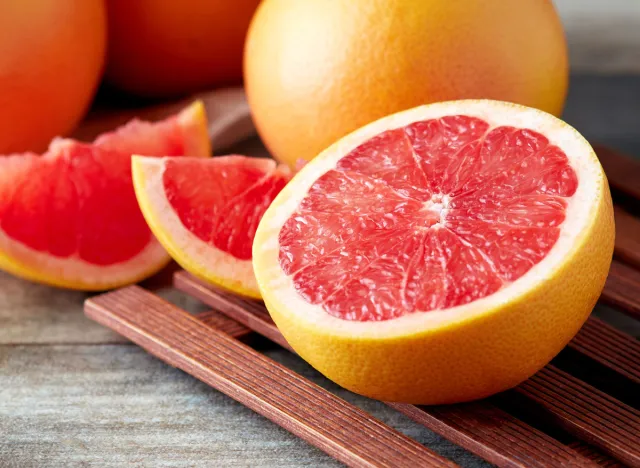

If you can handle the tartness that comes with a juicy grapefruit, you may want to incorporate more of this fat-burning food into your daily diet. “Some studies have suggested that grapefruit consumption before meals can lead to modest weight loss, and it’s thought to be related to its ability to reduce appetite and calorie intake,” says Goodson.
In one study from the journal Metabolism, it was found that participants who consumed grapefruit once a day for six weeks lost inches off of their waistline. However, there was no impact on body weight or blood pressure levels.
Fruit and vegetables in general can make great fat-burning foods. According to another recent study published in Frontiers in Nutrition, phytochemicals—which are the bioactive compounds found in fruits and vegetables—have been linked to helping with obesity and regulating metabolism.
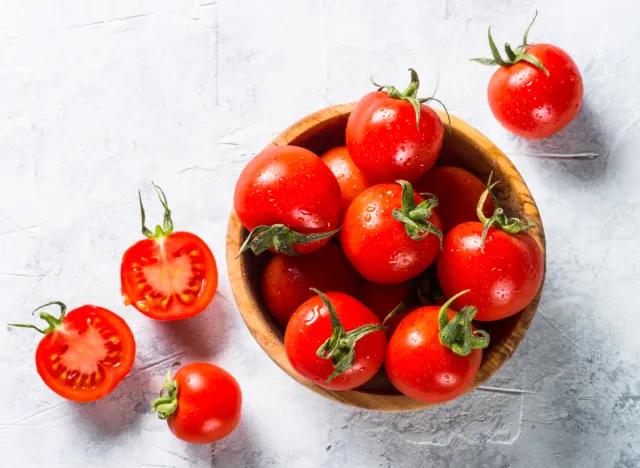

What if we told you there was a food that contained a compound that can help your body burn more fat through its DNA? Well, according to a study published in PLoS One, tomatoes contain the compound 9-oxo-ODA, which is linked to fat burning.
Not only that, but tomatoes are rich in the compounds beta-carotene, lycopene, and lutein. According to the Journal of Nutrition, lutein and beta-carotene are specifically associated with less visceral fat.
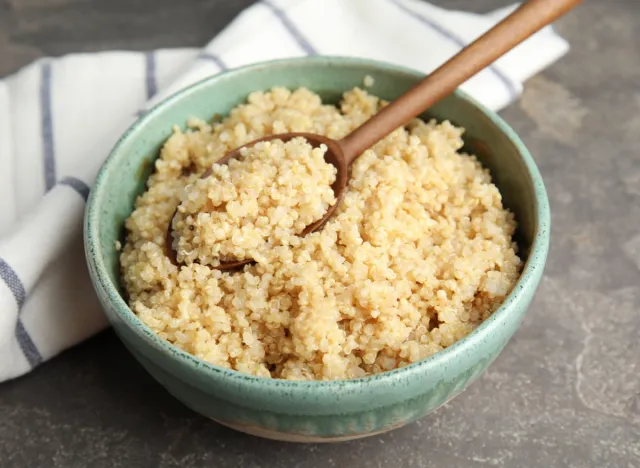

Replace your rice with quinoa on occasion for a helpful fat-burning whole grain. Quinoa can help with your fat loss goals in a multitude of ways. For starters, quinoa contains fiber and protein, both of which we’ve mentioned are nutrients needed for burning fat. According to a study published in the Journal of Diabetes Investigation, incorporating higher amounts of plant proteins into your diet can make you less susceptible to metabolic syndrome, which includes risk factors like obesity.
A more recent study, which was performed on mice, found that eating quinoa was directly related to reduced risk of obesity. Even though this is an animal study, the results are convincing for adding more of this whole grain to your diet.
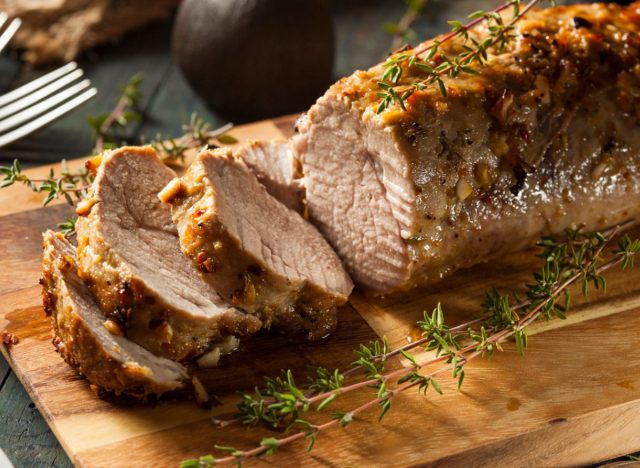

Pork often gets a bad rap for being higher in fat than other meats, but certain cuts of pork are much leaner than others. For instance, there are 22 grams of protein in pork tenderloin and less than three grams of fat!
In one study from Nutrients, some participants were asked to replace beef and chicken with pork for three months. After the three-month period, the group that ate pork experienced a decrease in body fat percentage and waist size. So even though pork may seem like the fattier option, this isn’t true if you choose the right cut.
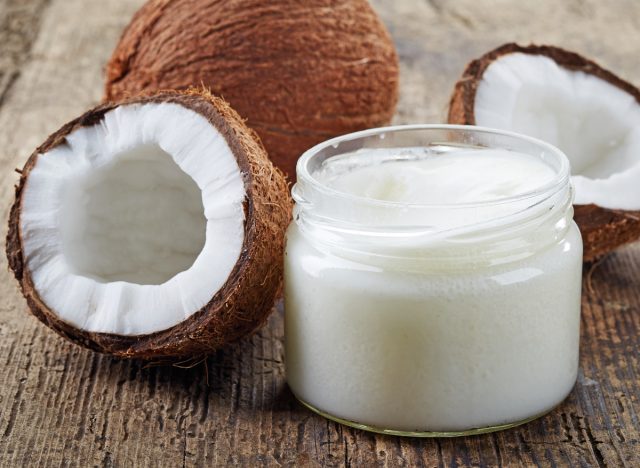

Even though coconut oil is a saturated fat, which is a type of fat that has been shown to possibly cause weight gain when consumed in excess, research shows that coconut oil is able to help in your overall goal of losing body fat. According to a study published in Lipids, women who ate coconut oil on a daily basis saw a decrease in inches around their waist and greater weight loss in general.
Women aren’t the only ones that research proves can benefit from coconut oil. One study from Food & Function says that this oil can help obese men with weight loss, as well as the “metabolic parameters” associated with obesity, which include things like high cholesterol.
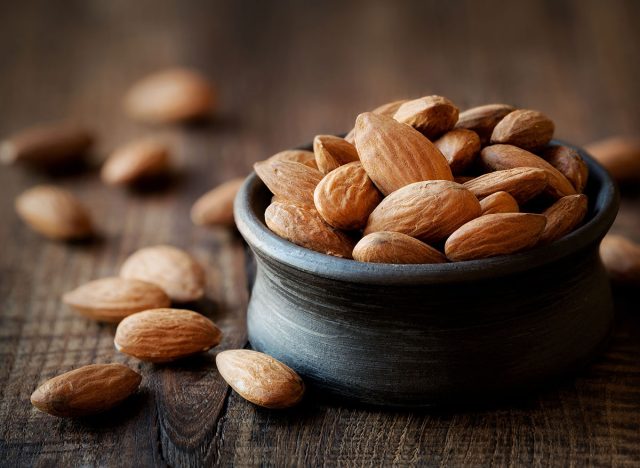

We mentioned earlier that nuts in general have fat-burning effects because of their protein and healthy fat content, but recent research has shown that almonds in particular may help with fat loss.
A 2021 study published in Nutrients found that almonds were associated with a decrease in body fat mass, as well as total fat mass. Another research study published a few years earlier discovered a link between eating almonds on a daily basis and reducing levels of fat around the abdomen and legs.
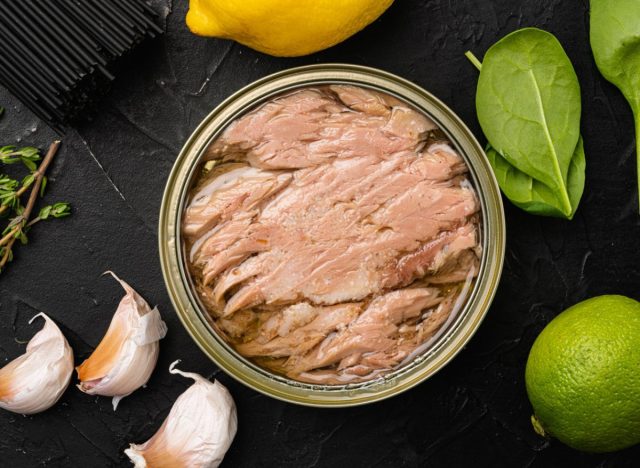

Not only is tuna a convenient and affordable snack that you can eat on its own or in a creamy tuna salad, but it’s also considered a fatty fish—meaning it’s full of anti-inflammatory, fat-burning omega-3 fatty acids.
A meta-analysis published in PLoS One found that even though there is still more research that needs to be done on the topic, supplementing omega-3 fatty acids can help reduce levels of abdominal fat and help prevent obesity if included as part of a healthy lifestyle.
We also mentioned previously that both protein and healthy fats can help in the fat-burning process, and tuna is full of both of these nutrients, making this delicious fish a potential fat-burning food to add to your diet.
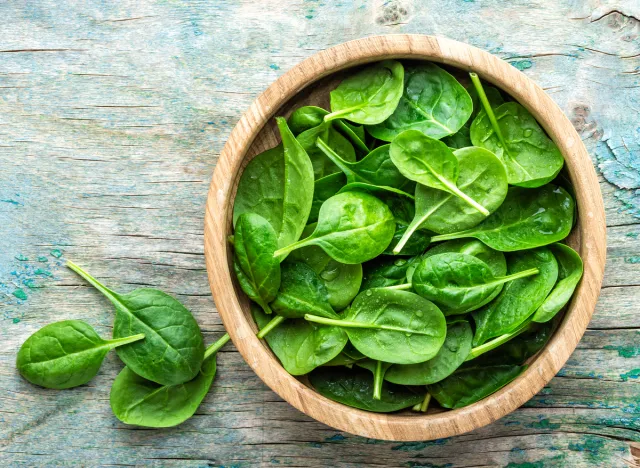

Spinach is a superfood for good reason. It’s full of vitamins and antioxidants, and eating this leafy green can help you achieve your fat-burning goals as part of a healthy diet.
Spinach is rich in plant membranes called thylakoids. These membranes hold chlorophyll, the pigment that turns vegetables green. Research has found that consuming spinach extracts that contain thylakoids can have numerous health benefits—including helping you to lose body fat.
One 2015 study found that supplementing thylakoids consistently for three months helped to reduce hunger and improve feelings of satiety throughout the day. These researchers say that supplementing this plant membrane found in spinach and other green vegetables can help with weight loss or weight management over time.
Another 2020 study concluded that consumption of specific spinach-derived thylakoids resulted in decreased weight, waist circumference, and fat mass.
Supplementing thylakoids will provide your body with more than what you can get from eating a serving of spinach, but these research results show that spinach can aid in your fat-burning goals because of its powerful pigments and compounds.
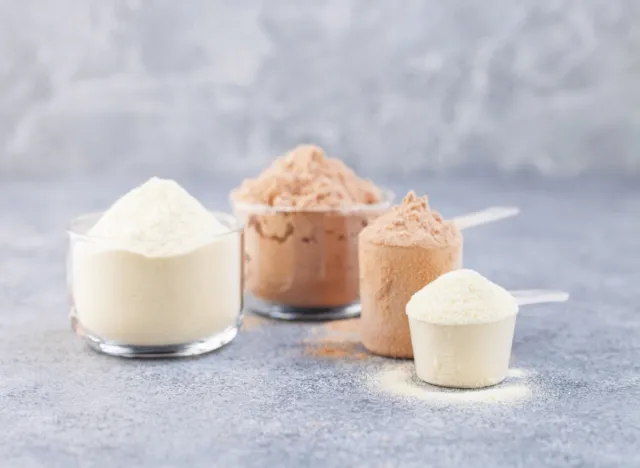

You can throw it in your smoothie, make a protein shake, or get creative and bake with it, but either way, consuming whey protein powder can help you burn more fat.
For starters, whey protein has been found to help activate what is known as fullness hormones in the body, potentially leading to a decrease in overeating. This protein powder has also been found to help prevent obesity and increase thermogenesis—the process that helps your body burn fat and speed up metabolism.
And, as mentioned before, high-protein foods help to burn more fat, and a serving of regular whey protein powder contains around 25 grams of protein.
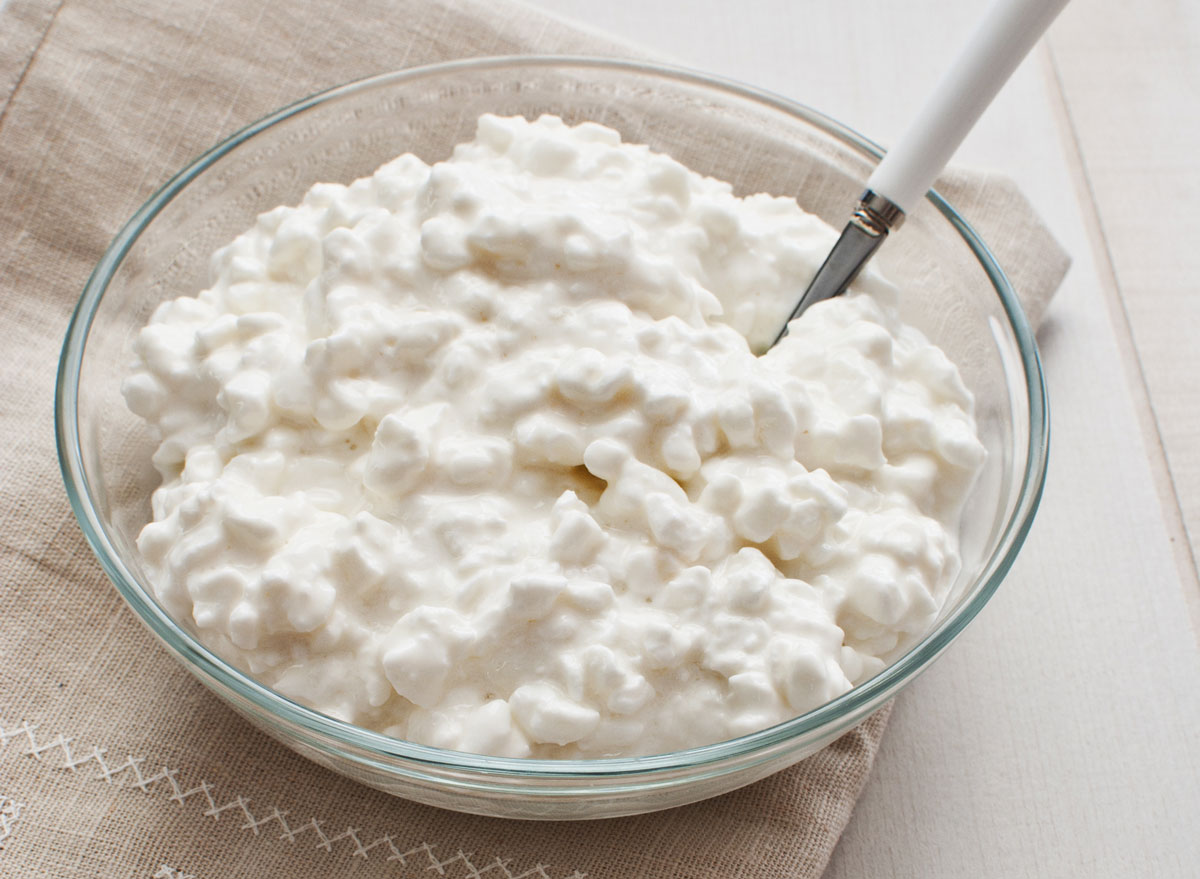

Cottage cheese has become the next big thing, but it’s good for more than just a base for your favorite homemade ice cream. Full of protein and low in calories from fat, this cheese can help you burn more body fat.
In fact, one study found that after a year of eating more high-protein foods (which included cottage cheese), participants lost more weight and inches around their waist. Because cottage cheese is a dairy product, it is also high in calcium. According to the International Journal of Molecular Sciences, calcium can aid in weight loss and fat burning.
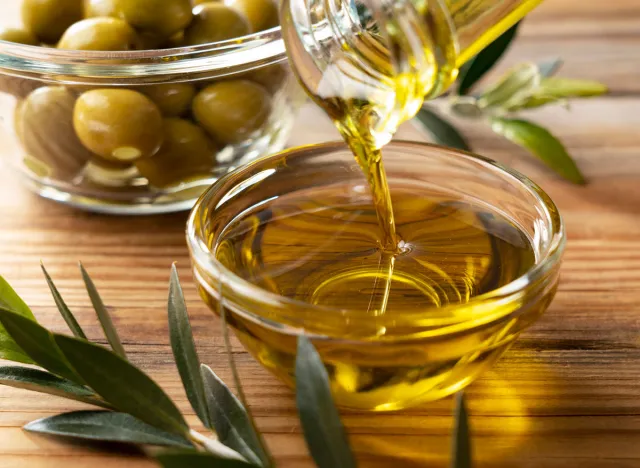

When you think of all the health benefits related to olive oil—lowering your risk of heart disease, decreasing your risk of premature death, and lowering cholesterol—it shouldn’t come as much of a surprise that extra virgin olive oil (EVOO) would also provide fat-burning benefits, too.
In a study published in the European Journal of Nutrition, women with “excess body weight” were given either a breakfast that contained EVOO or one that contained soybean oil for a period of nine weeks. In the end, those who consumed olive oil both lowered their body fat mass and reduced blood pressure levels as well. So, don’t be afraid to add this fat-burning food to your next salad or as a base for whatever you’re cooking next.
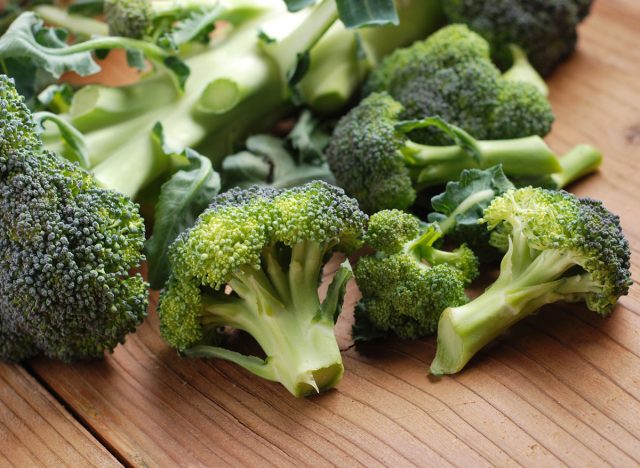

Not everyone loves this cruciferous vegetable, but if you enjoy some broccoli from time to time, you may want to add it as a regular part of your diet. For starters, broccoli contains a helpful dose of fiber, which can aid in keeping you full and improving your gut health.
But broccoli is also high in a specific plant compound called sulforaphane (this compound is found in other cruciferous vegetables like bok choy or brussels sprouts). Sulforaphane has been found to potentially help improve heart health and protect against cardiovascular disease, but recent animal research shows that it may also help in weight loss and fat reduction.
According to a 2022 study published in eLife, mice that were treated with sulforaphane saw a significant decrease in fat mass. Of course, more research needs to be done to see how this compound can help with human fat loss, but it’s a convincing start for why you may want to eat a bit more broccoli.
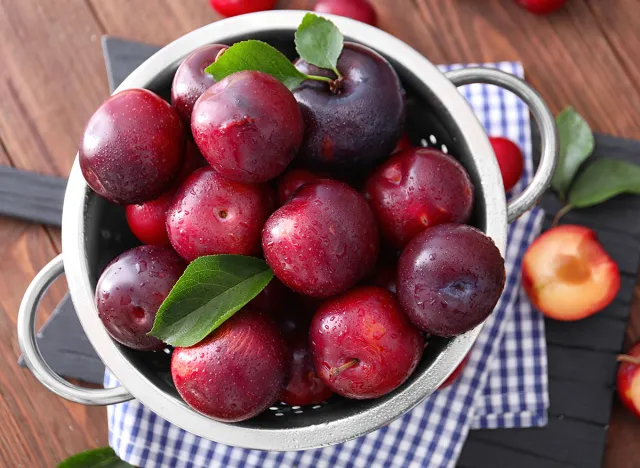

Many people probably just think of plums as the base fruit for prunes—the antidote to certain digestive issues keeping you from going to the bathroom. But this fruit offers so much more in terms of health benefits, especially because it’s so rich in a flavonoid called anthocyanins, which give plums their deep red coloring.
Anthocyanins are known for their powers against neurodegenerative and cardiovascular diseases, but research has also found that they may be able to help with weight loss and fat storage. According to a study published in Oxidative Medicine and Cellular Longevity, anthocyanins can help with weight loss and adipose tissue—AKA body fat.

